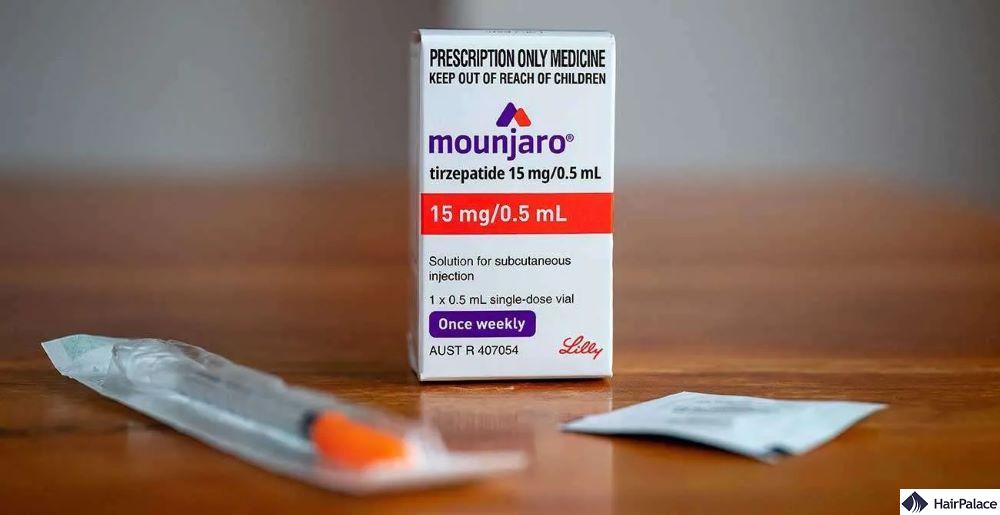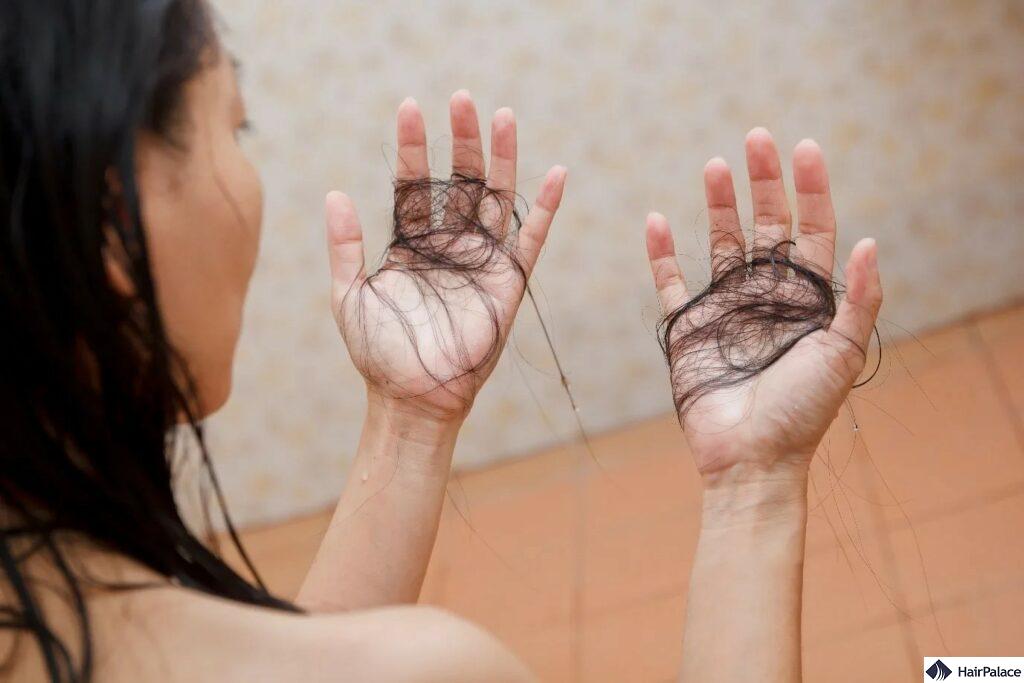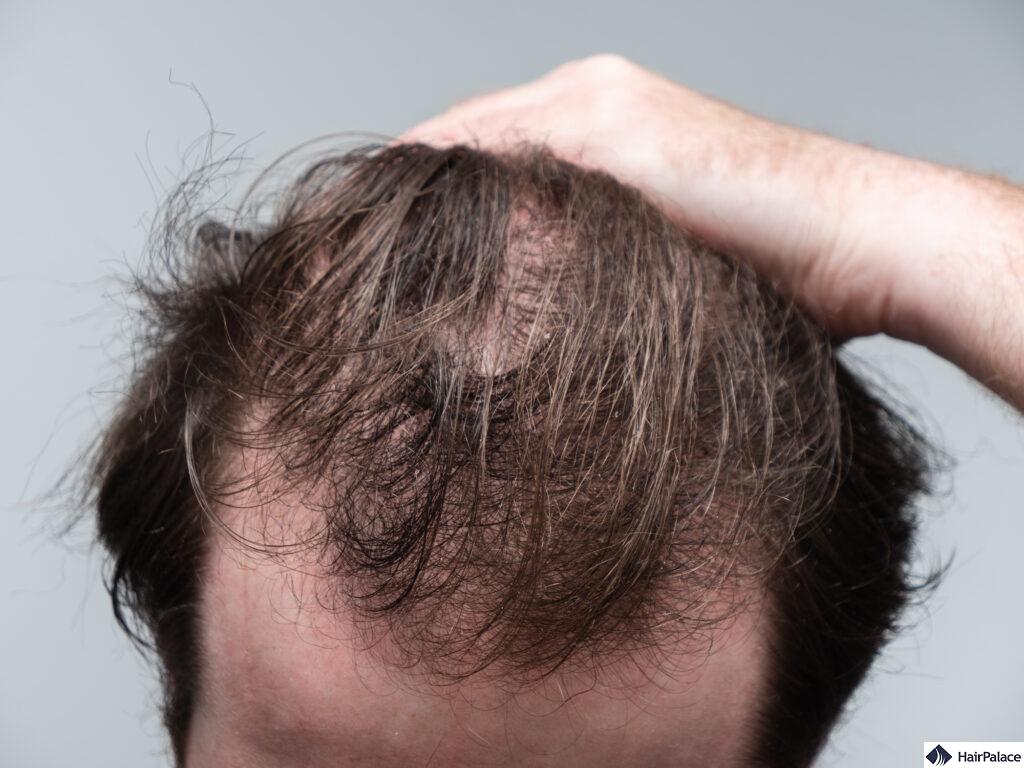Mounjaro Hair Loss: Causes, Solutions and Prevention

Mounjaro hair loss is an increasingly discussed concern among users taking tirzepatide to treat type 2 diabetes or to lose weight.
Although not everyone experiences it, the sudden onset of thinning hair or excessive shedding can be unsettling.
This is especially true when you’re making significant strides in your health.
Fortunately, this type of hair loss is usually temporary and treatable, but understanding the underlying causes is essential for managing or preventing it effectively.
In this article, we’ll dive into the causes of Mounjaro-related hair loss and explore proven solutions.
We’ll also share practical tips for protecting your hair while achieving your wellness goals.
- What is Mounjaro?
- Benefits
- Side effects
- Can Mounjaro cause hair loss?
- How does Mounjaro cause hair loss?
- Mounjaro hair loss prevention
What is Mounjaro?

Mounjaro is the brand name for tirzepatide, a once-weekly injectable medication primarily approved for the treatment of type 2 diabetes.
It was more recently approved for chronic weight loss management under the brand name Zepbound after discovering its rapid weight loss potential.
Tirzepatide mimics the action of two naturally occurring hormones: GLP-1 (glucagon-like peptide-1) and GIP (glucose-dependent insulinotropic polypeptide).
These hormones play crucial roles in regulating blood sugar levels, insulin secretion, and appetite.
By activating both receptors, Mounjaro offers a synergistic effect that improves glycemic control and significantly reduces body weight.
In clinical trials, Mounjaro not only helped patients achieve superior blood sugar reductions compared to other treatments, but it also led to substantial weight loss.
In some cases, this meant more than 20% of body weight.
The weight loss treatment works by slowing gastric emptying, enhancing insulin sensitivity, reducing glucagon levels, and most notably, suppressing appetite.
Mounjaro is administered via a subcutaneous injection once a week and comes in a range of dose strengths (2.5 mg up to 15 mg).
This medication represents a major advancement in metabolic health and is seen as a transformative option for blood sugar control and sustainable weight management.
Mounjaro benefits

Mounjaro (tirzepatide) offers a powerful combination of benefits for individuals with type 2 diabetes or those seeking medical weight loss support.
As a dual GIP and GLP-1 receptor agonist, it works in multiple ways to improve metabolic health.
For people with diabetes, it helps lower blood sugar levels by increasing insulin release when glucose levels are high, while simultaneously reducing glucagon.
Additionally, Mounjaro slows down digestion, which not only aids in blood sugar regulation but also enhances feelings of fullness, leading to significant weight reduction.
Clinical trials have shown that patients on Mounjaro can experience more substantial weight loss than with other medications in its class, such as semaglutide.
Beyond weight and glucose control, patients often report better appetite management, lower cholesterol and triglyceride levels, improved insulin sensitivity, and reduced risk factors for cardiovascular disease.
Its once-weekly dosing makes it a convenient and manageable treatment option, contributing to high adherence rates among users.
Main Benefits of Mounjaro:
- Significant weight loss (up to 20% of body weight in clinical trials)
- Improved blood sugar control for people with type 2 diabetes
- Dual hormone action (GLP-1 + GIP) for enhanced metabolic effects
- Appetite suppression and reduced cravings
- Improved insulin sensitivity
- Lowered fasting blood glucose and A1C levels
- Reduced cholesterol and triglyceride levels
- Potential cardiovascular risk reduction
- Shown to outperform several existing diabetes and weight-loss medications
Mounjaro side effects (hair loss)

Like most prescription medications, Mounjaro (tirzepatide) can cause side effects, most of which are manageable, but some may require medical attention.
It primarily affects the gastrointestinal system, especially during the early stages of treatment.
Many side effects are linked to how the medication slows digestion and alters hormonal signals related to appetite, insulin, and blood sugar.
While most people experience mild to moderate symptoms, a smaller number may encounter more serious or rare adverse effects.
Importantly, some side effects may subside over time as the body adjusts to the medication.
If symptoms persist or worsen, it’s essential to consult a healthcare provider. These can include:
- Nausea
- Vomiting
- Diarrhea
- Constipation
- Decreased appetite
- Indigestion or heartburn
- Stomach pain or bloating
- Fatigue
- Temporary hair loss (telogen effluvium)
- Headache
- Injection site reactions (redness, itching, or swelling)
- Dizziness
While rare, Mounjaro can cause serious side effects that require immediate medical attention.
These include pancreatitis, gallbladder issues like gallstones, severe allergic reactions, kidney problems, and hypoglycemia.
Can Mounjaro cause hair loss?

Mounjaro (tirzepatide) can be associated with hair loss in some individuals, but it’s important to understand the context.
Clinical trials for its weight loss use reported hair thinning (alopecia) in about 4–5% of patients, compared to around 1% in placebo groups.
This suggests that the hair loss is likely linked to rapid weight loss or nutrient deficiencies, rather than the medication itself directly damaging hair follicles.
The most likely explanation is a condition called telogen effluvium, a temporary form of hair shedding triggered by physical stress on the body.
Mounjaro strongly suppresses appetite, which can lead to reduced food intake and nutritional imbalances if not monitored properly.
Many users experiencing hair loss while on Mounjaro report that it begins 2–3 months into treatment and peaks around 4–5 months.
It often gradually improves once weight stabilises and nutritional needs are addressed.
In most cases, it causes temporary hair loss or hair thinning that is easily reversible.
Maintaining a balanced, protein-rich diet, taking a daily multivitamin, staying hydrated, and reducing stress can help minimise or prevent shedding.
Topical treatments like minoxidil (Rogaine) or supplements like biotin, iron, or zinc may support regrowth.
Always consult your doctor or a dermatologist if you’re experiencing significant hair loss; they can help identify the cause and recommend appropriate steps to manage it.
How does Mounjaro cause hair loss?

Mounjaro (tirzepatide) doesn’t directly damage hair follicles, but it can trigger indirect hair loss in some individuals, especially those using it for weight loss.
The most likely cause is a condition called telogen effluvium, a temporary form of hair shedding that happens when the body undergoes significant physical stress.
In the case of Mounjaro, this stress is often due to rapid weight loss, reduced calorie and protein intake, and hormonal changes.
Mounjaro significantly reduces appetite, which can lead to people unintentionally eating too little, especially in terms of protein and essential nutrients.
When your body perceives a sudden nutritional or energy deficit, it prioritises vital organs over non-essential functions like hair production.
This can impact your hair growth cycle, causing many healthy hair follicles to prematurely enter the telogen resting phase, and then a few months later, those hairs begin to shed all at once.
This process usually starts 2–3 months after a major change, such as starting Mounjaro or losing a large amount of weight quickly.
It can also be worsened by hormonal shifts, stress, and even underlying genetic hair conditions that get triggered or accelerated by weight loss.
Some people may also have a predisposition to androgenetic alopecia, and Mounjaro’s effects on hormones or insulin sensitivity could potentially unmask that sooner.
Mounjaro may lead to hair loss indirectly through its impact on appetite, weight loss, nutrition, and metabolic balance.
The good news is that this kind of hair loss is usually temporary and reversible with proper nutrition, time, and care.
Maintaining healthy hair conditions can often aid hair regrowth.
Mounjaro hair loss prevention

If you’re taking Mounjaro and are concerned about hair loss, the good news is that it’s often preventable or manageable, especially if caught early.
Most hair loss reported on Mounjaro and other weight loss drugs is temporary.
Since Mounjaro strongly suppresses appetite to achieve rapid weight loss, it’s easy to under-eat without realising it, which can affect your hair’s health.
Fortunately, there are practical steps you can take to help minimise or prevent hair shedding while still benefiting from the medication.
Eat Enough Calories
Even with a reduced appetite, aim to meet your body’s basic energy needs.
Extreme calorie restriction is a major trigger for telogen effluvium.
Prioritise Protein Intake
Hair is primarily made of keratin, a type of protein. To support healthy hair growth, it’s important to get enough protein through a balanced diet.
Aim to consume at least 60–80 grams of protein daily, depending on your body weight and activity level.
Take a Daily Multivitamin
Use a high-quality multivitamin that includes biotin, zinc, iron, B12, vitamin D, and other key nutrients that support hair growth.
Supplement if Needed
If blood work shows a deficiency, take targeted supplements.
Stay Hydrated
Dehydration can worsen hair and skin health. Make sure you’re drinking plenty of water daily.
Avoid Crash Diets
Mounjaro alone promotes weight loss, you don’t need to drastically cut carbs or calories further.
Slow, steady weight loss reduces shock to your system.
Reduce Stress
High stress can also trigger hair loss.
Try relaxation techniques like walking, breathing exercises, or mindfulness.
Be Gentle With Your Hair
Use mild shampoos, avoid tight hairstyles, minimise heat styling, and avoid harsh chemical treatments during this sensitive period.
Consider Topical Treatments
If shedding becomes noticeable, topical minoxidil (Rogaine) or rosemary oil may help support regrowth.
Monitor and Adjust With Your Doctor
If you’re experiencing excessive hair loss, talk to your provider.
They can check for deficiencies, suggest dietary changes, or adjust your dose if needed.
Most importantly, telogen effluvium is temporary; in most cases, hair begins to regrow within a few months as your body stabilises.
With proper nutrition and care, you can support your hair health while continuing your progress with Mounjaro.
Mounjaro and hair loss FAQ
To stop Mounjaro-related hair loss, focus on eating enough calories and protein, taking a daily multivitamin, staying hydrated, and reducing stress. Most hair loss is temporary (telogen effluvium) and improves as your body adjusts. If needed, use topical treatments like minoxidil and consult your doctor to rule out nutrient deficiencies or other causes.
- Ross EK, Shapiro J. Management of Hair Loss. Dermatologic Clinics 2005;23(2):227-243.https://doi.org/10.1016/j.det.2004.09.008.
- Tirzepatide (Mounjaro) for type 2 diabetes. Med Lett Drugs Ther. 2022 Jul 11;64(1654):105-107. PMID: 35802842.https://pubmed.ncbi.nlm.nih.gov/35802842/
- Forzano I, Varzideh F, Avvisato R, Jankauskas SS, Mone P, Santulli G. Tirzepatide: A Systematic Update. Int J Mol Sci. 2022 Nov 23;23(23):14631. doi: 10.3390/ijms232314631. PMID: 36498958; PMCID: PMC9741068.https://pubmed.ncbi.nlm.nih.gov/36498958/
- Godfrey H, Leibovit-Reiben Z, Jedlowski P, Thiede R. Alopecia associated with the use of semaglutide and tirzepatide: A disproportionality analysis using the FDA adverse event reporting system (FAERS) from 2022 to 2023. J Eur Acad Dermatol Venereol. 2025 Feb;39(2):e153-e154. doi: 10.1111/jdv.20197. Epub 2024 Jun 24. PMID: 38925559.https://pubmed.ncbi.nlm.nih.gov/38925559/
- Kim TH, Lee K, Park S, Oh J, Park J, Jo H, Lee H, Cho J, Wen X, Cho H, Kim S, Yon DK. Adverse drug reaction patterns of GLP-1 receptor agonists approved for obesity treatment: Disproportionality analysis from global pharmacovigilance database. Diabetes Obes Metab. 2025 Apr 2. doi: 10.1111/dom.16376. Epub ahead of print. PMID: 40176478.https://pubmed.ncbi.nlm.nih.gov/40176478/


